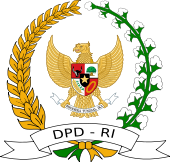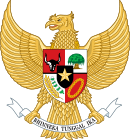- Regional Representative Council
-
The Regional Representative Council
Dewan Perwakilan Daerah
Type Type Upper house of People's Consultative Assembly Term limits 1 term (5 years) Leadership Speaker Irman Gusman
since 1 October 2009Members 132 Elections Last election 9 April 2009 Meeting place Legislative Complex
Jakarta
IndonesiaWebsite www.dpd.go.id Indonesia 
This article is part of the series:
Politics and government of
Indonesia
Government
- Executive Branch
- Legislative Branch
- People's Consultative Assembly
- Regional Representative Council
- People's Representative Council
- Judicial Branch
- Supreme Court
- Constitutional Court
- Judicial Commission
- Administrative divisions
- Regional government
- Foreign relations
The The Regional Representative Council (Indonesian: Dewan Perwakilan Daerah, DPD) is one of two parliamentary chambers in Indonesia. Together with the People's Representative Council, it makes up a third chamber, the People's Consultative Assembly.[1]
Contents
History
The DPD was created by the third amendment to the 1945 Constitution of Indonesia enacted 9 November 2001 in a move towards bicameralism. The DPD does not have the revising powers of an upper house like the United States Senate. Article 22D restricts the DPD to dealing with bills on "regional autonomy, the relationship of central and local government, formation, expansion and merger of regions, management of natural resources and other economic resources, and Bills related to the financial balance between the centre and the regions."[2][3]
The International Foundation for Electoral Systems conducted a tracking survey in the Indonesian legislative elections in 2004 which showed that not all voters knew how to vote for candidates for the new Regional Representative Council, or were even aware of its existence.[4]
Powers and structure
The DPD can propose such bills to the People's Representative Council (Dewan Perwakilan Rakyat/DPR) and must be heard on any regional bill proposed by the DPR. Each province elects 4 members to the DPD on a non-partisan basis, although many candidates in the April 2004 election had links to the parties represented in the People's Representative Council, the Dewan Perwakilan Rakyat or DPR.
A third legislative body, the People's Consultative Assembly (Indonesian: Majelis Permusyawaratan Rakyat) (MPR), comprises the members of the DPR and the DPD.
References
- Denny Indrayana (2008) Indonesian Constitutional Reform 1999-2002: An Evaluation of Constitution-Making in Transition, Kompas Book Publishing, Jakarta ISBN 978-979-709-394-5
Notes
External links
- DPD homepage (Indonesian)
Categories:- National upper houses
- Government of Indonesia
- People's Consultative Assembly
Wikimedia Foundation. 2010.
